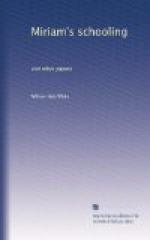“Hooray!” he cried in his mad delight, and the mimic planets recommenced their journeys as silently almost as their great archetypes outside.
“Strange,” he said with a smile, “that such a chip as that should upset the whole solar system.”
Miriam looked at him for a moment inquiringly, and then fell to watching the orrery again. Slowly the moon waxed and waned. Slowly the winter departed from our latitude on the little ball representing our dwelling-place, and the summer came; and as she still watched, slowly and almost unconsciously her arms crept round her husband’s waist.
“That is a fair representation,” said Mr. Armstrong, “of all that is directly connected with us, excepting, of course, as I have told you, that we could not keep the distances.” A little later on, although he disapproved of “gaping,” as he called it, he taught Miriam so much of geometry as was sufficient to make her understand what he meant when he told her that a fixed star yielded no parallax, and that the earth was consequently the merest speck of dust in the universe. She found his simple trigonometry very, very hard, but to her husband it was easy, and with his help she succeeded.
One afternoon, wet and dreary, Miriam had taken up her book. There was nothing to do in the shop, and Mr. Farrow entered the parlour in one of his idle moods, repeating the same behaviour which had so often distressed Miriam when she was reading anything for which he did not care. She had recovered from the dust upstairs a ragged volume in paper boards, and she was musing over the lines—
“But bound and fixed in fettered
solitude
To pine, the prey of every changing mood.”
The poem was about as remote in its whole conception and treatment from Mr. Farrow as it could well be, and his monkey-tricks exasperated her. She shut her book in wrath and misery, left the room, dressed, and went out. The sky had cleared, and just after the sunset there lay a long lake of tenderest bluish-green above the horizon in the west, bounded on its upper coast by the dark grey cloud which the wind was slowly bearing eastward. In the midst of that lake of bluish-green lay Venus, glittering like molten silver. Miriam’s first thought was her husband. She always thought of him when she looked at planets or stars, because he was so intimately connected with them in her mind. She waited till it was late and she then turned homewards. A man overtook her whom she recognised at once as Fitchew the jobbing gardener, porter, rough carpenter, creature of all work in Cowfold, one of the honestest souls in the place. He had his never-failing black pipe in his mouth, which he removed for a moment in order to bid her good-night. She kept up with him, for it was dusk, and she was glad to walk by his side. Fitchews had lived in Cowfold for centuries. An old parson always maintained that the name was originally Fitz-Hugh, but this particular




